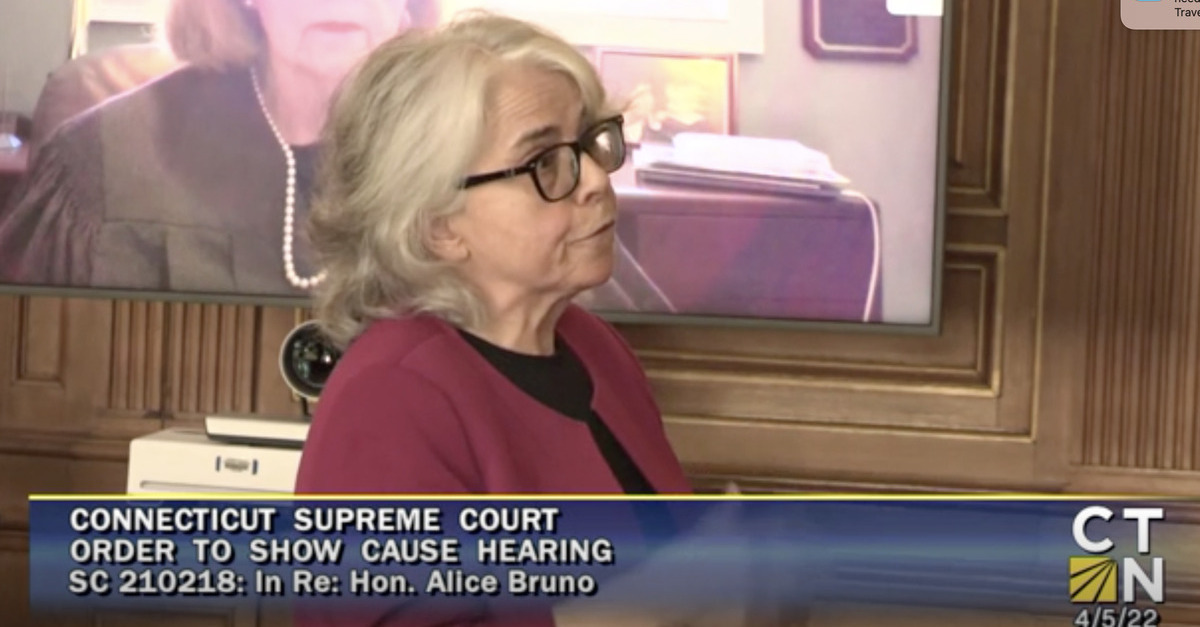
Connecticut Superior Court Judge Alice Bruno
Connecticut’s highest court issued an order Tuesday that opened an official investigation of a judge who was absent from the bench for two years but still collected a salary of more than $400,000.
Alice Bruno was confirmed as a judge of the Connecticut’s Superior Court in February of 2016. But after serving for three and a half years, she stopped showing up at work, and last took the bench in November 2019, according to court documents.
Since that time, Judge Bruno continued to collect her full salary, but consistently refused to come in to work, the court documents say. Bruno cited a “debilitating medical condition” for her absence, but has refused to elaborate. In various documents submitted to the court in her defense, Bruno said that her bosses were hostile toward her and her request for accommodations, and that their hostility exacerbated her already serious medical condition.
Bruno’s medical records remain sealed per an order by the court, but a newly-appointed investigator will soon have access to those and other records.
After two years passed with Bruno absent from the bench, the Connecticut Supreme Court ordered Bruno to appear in person and answer why she should not be removed or suspended. The unprecedented proceedings aimed to ascertain whether Bruno’s conduct violated Connecticut’s code of judicial conduct.
Even in responding to the Supreme Court’s order, however, Bruno tried her best to stay away from the courthouse. On April 4, 2022, the day before a hearing was scheduled in the matter, Bruno’s attorney filed a motion to excuse Bruno’s personal appearance. Through counsel, Bruno argued that she “once again required emergency medical treatment arising from the circumstances surrounding her request for accommodation that has been ongoing for nearly two years.”
The court denied Bruno’s request to absent herself from the hearing, but allowed that Bruno’s attorney be permitted to assist his client in answering questions at the proceeding.
During the hearing, Justice Andrew J. McDonald made the following pointed inquiry of Bruno’s attorney, Jacques Parenteau: “You’ve indicated that over the last two-plus years, Judge Bruno has not performed any services on behalf of the people of Connecticut in exchange for the $400,000 she has received. Is that correct?” Parenteau responded that the pay received by his client amounted to an accommodation for her medical need.
When Bruno addressed the court, she said that the suggestion that her supervisors’ suggestion that she should seek a “disability retirement” was “a daunting and devastating experience.” Bruno continued, saying:
“And the unfortunate circumstance is that I ended up with all the indicia of someone who could not perform my function in the way that it should best be performed. I thank you for your courtesy and giving me the chance to talk and speak and there is nothing I want more than to serve the people of Connecticut fairly and appropriately.”
The state high court issued its ruling Tuesday. Under that ruling, Bruno must now cooperate with the investigation or risk further disciplinary proceedings. Per the court’s three-page order:
Specifically, the purpose of the Investigation is to obtain information relevant to determine whether Judge Bruno’s conduct in connection with her performance of, or failure to perform, judicial functions since her appointment as a
Superior Court Judge in 2015 violates, inter alia, Rules 1.2 (Promoting Confidence in the Judiciary); 2.1 (Giving Precedence to the Duties of Judicial Office); and 2.5 (Competence, Diligence, and Cooperation) of the Code of Judicial Conduct. The Investigation shall be confidential.
The court appointed Connecticut Deputy Chief State’s Attorney and Inspector General Robert Devlin to conduct the investigation and directed Bruno to “fully and promptly cooperate” with Devlin’s investigatory demands. Further, if Devlin deems it necessary, Bruno must submit to one or more medical evaluations. Devlin will also have access to Bruno’s medical records, though he is expected to keep those records confidential.
Counsel for Judge Bruno did not immediately respond to Law&Crime’s request for comment.
[screengrab via Connecticut Network]
Have a tip we should know? [email protected]